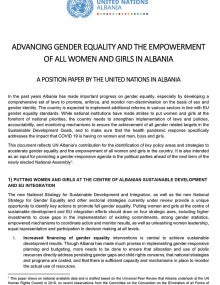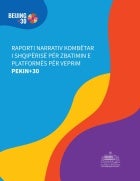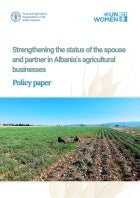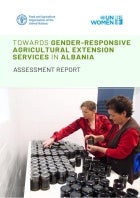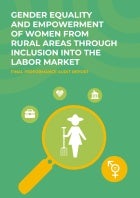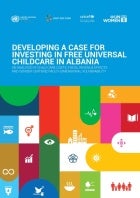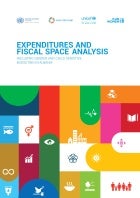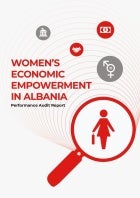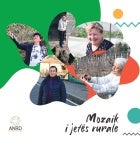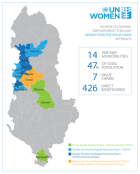1 - 11 of 11 Results
Date:
Albania's national report on the implementation of the Beijing Declaration and Platform for Action (2019-2024). In addition to achievements and challenges, the report includes the country's priority for the next 5 years. The reporting process was led by the Ministry of Health and Social Protection, with the technical support of UN Women.
Date:
This policy paper highlights best practices from Belgium, France, and Spain, offering valuable insights for Albania as it advances toward EU accession and gender equality, with the aim of promoting women's rights and boosting economic opportunities in agriculture.
Date:
Since the launch of UN Women’s strategic note for Albania (2022–2026), UN Women Albania has made significant strides in enhancing its reach and impact across the nation.
Date:
This document presents the findings of a qualitative study that assessed the extent, progress and challenges of providing gender-responsive agricultural extension services in Albania.
Date:
This audit report aims to evaluate the policies and their effectiveness in delivering quality services to promote the employment of women in rural areas.
Date:
The study provides concrete evidence on how gender sensitive public investment has important ramifications in terms of who benefits from child care and job creation. Beyond “who” benefits, the report also presents a comparative analysis of “how much and what kind of” benefits can be expected from each additional dollar gender-sensitive public spending versus gender-blind spending in universal child care.
Date:
This analysis aims to shed light on the scope of gender responsive fiscal policies to address gender and child sensitive socio-economic vulnerabilities. This report analyzes the selected gender-sensitive fiscal policy and the mechanisms through which the policies affect social protection systems including women labor force participation, wage gaps, GDP growth, public fiscal balances, income distribution, and poverty.
Date:
The Supreme State Audit Institution in Albania has conducted a performance audit on the “Economic Empowerment of Women”, in the framework of the “Transformative Financing for Gender Equality Towards More Transparent, Inclusive and Accountable Governance in the Western Balkans” project, financed by the Government of Sweden – SIDA, with the technical support of UN Women Albania.
Date:
This photo album aims to showcase rural Albania, where women take on many roles. It contains different stories of women and girls from the areas of Puka, Elbasan and Kolonja, focusing on their challenges in their daily lives, family, work and leisure. This photo album was prepared by Albanian Network for Rural Development, a UN Women partner within the "Gender Rural Equality and Torusim” (GREAT) project, financed by the Italian Government.
Date:
In the framework of the Gender Sensitive post-earthquake Recovery and Reconstruction project, UN Women conducted 10 Gender Sensitive Value Chain Analysis (GSVCA) in the earthquake-affected municipalities of Shijak, Durrës, Krujë, Tiranë, Kavajë, Vorë, Rrogozhinë, Kurbin, Mirditë and Lezhë. These GSVCAs identify and promote ‘win-win’ scenarios that guarantee market sustainability, and provide development opportunities that address problems in a value chain in conjunction with addressing gender inequalities inherent in and along the chain.
Date:
Gender Brief Albania 2016 gives an overview and analysis of gender equality in Albania. It captures on-going work, reviews progress and identifies gaps in implementing Albania’s international and national commitments on gender equality and the empowerment of women. To support EU policy makers in tailoring pre-accession assistance to the Government of Albania, it presents priority actions to improve the lives of Albanian women and girls in six key areas and identifies new, emerging sectors that require action.
